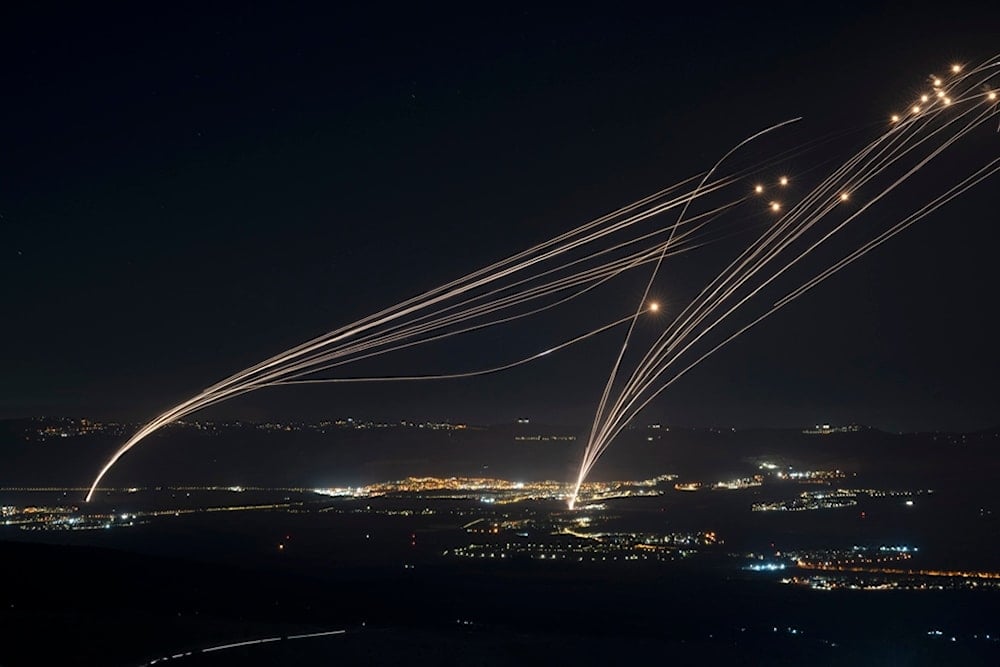Iran, Hezbollah retaliation to put shaky Israeli air defenses to test
Media reports suggest that the anticipated Iranian and Lebanese responses to the recent Israeli assassinations would overwhelm the Israeli air defenses.
-

The Israeli Iron Dome air defense system fires to intercept an attack from Lebanon over the al-Jalil region as seen from the Israeli-occupied Syrian Golan Heights, Sunday, Aug. 4, 2024. (AP)
The history of Israeli invasions of Lebanon is marked by failure and "Israel’s" renowned Iron Dome air defense system risks being overwhelmed by the sheer volume of Hezbollah's missiles, suggested John Sawers, former head of the British Secret Intelligence Service MI6 and UK ambassador to the UN.
In an opinion piece published in the Financial Times news website, Sawers highlighted that Hezbollah poses a great threat to "Israel" with its arsenal of rockets and missiles and its claimed 100,000-strong fighters.
He mentioned that when Israeli Prime Minister Benjamin Netanyahu's military chiefs wanted to invade Lebanon after October 7, the premier "held them back."
However, according to Sawer, it seems that Netanyahu's "thinking seems to have evolved," adding that the unwritten rules that govern the low-level fighting between "Israel" and Hezbollah indicated that the assassination of top Hezbollah commander Fouad Shokor in Beirut was not justified by the missile that struck the Druze town of Majdal Shams in the occupied Syrian Golan.
"It was a deliberate escalation by Israel," he suggested.
Sawers considered that "Israel's" assassination of the head of Hamas' Political Bureau Chief Ismail Haniyeh in Tehran and Shokor in Beirut revealed Netanyahu's priorities and strategy.
The Israeli Prime Minister "is prepared to escalate tensions in the region rather than seeking to calm them," he pointed out.
Sawer said that Haniyeh's assassination also proves that Netanyahu is not interested in a ceasefire in Gaza and a prisoner exchange deal with Hamas, adding that the release of Israeli captives held in the Gaza Strip "doesn’t feature prominently in his strategy" as he has turned down numerous deals supported by his own security officials.
The former MI6 chief emphasized that Netanyahu wants Donald Trump back in the White House, especially that Democratic alternative Kamala Harris "lacks Joe Biden’s long engagement and heartfelt sympathy for Israel."
He described the Republican presidential hopeful as "the most easily manipulated US President Israel has ever enjoyed."
According to Sawer, Netanyahu is aware that the United States will have to intervene to support "Israel" if an open war breaks out with Iran or Hezbollah.
But the former UK ambassador to the UN explained that this would ignite divisions within the Democrats and could lead to Harris losing a major swing state like Michigan, where 2% of the population is Arab-American, which explains the urgent efforts by the Biden administration to avoid an imminent war in Lebanon, contrary to Netanyahu's goal.
Can Israeli air defenses withstand the Axis of Resistance's attacks?
In a related context, Bloomberg discussed the threats facing "Israel" and its air defense systems as it prepares for the possibility of new aerial attacks from Iran, Hezbollah, and Yemen.
The news website said that "Israel’s" billion-dollar air defense systems are being tested, especially as Hezbollah and the Yemeni Armed Forces have intensified their use of kamikaze drones, "which have proven more effective at evading Israel’s high-tech defenses than missiles and rockets."
The report mentioned that Iran is believed to possess a substantial stockpile of ballistic and cruise missiles, as well as inexpensive drones, which it used in mid-April in its retaliation against the Israeli aggression that targeted its consulate in Damascus.
Regarding Hezbollah, Bloomberg emphasized that the Lebanese group is believed to have an arsenal of over 150,000 missiles, including long-range and precision-guided ones.
According to Israeli assessments, these missiles could potentially reach deep into "Israel", targeting major cities and strategic assets such as military bases, airports, power grids, and hospitals.
As for the Yemeni Armed Forces, the report highlighted that, in addition to targeting commercial ships in the Red Sea, the YAF have been launching ballistic missiles and drones toward "Israel".
It recalled that on July 19, a YAF drone struck a building in Tel Aviv, killing one settler and injuring several others.
Discussing the Israeli air defenses' ability to repel multiple attacks, Bloomberg noted that Hezbollah has already caused damage in the north of occupied Palestine since October using one-way drones, with many of them capable of evading Israeli defenses.
It added that the Yemeni drone attack on Tel Aviv, which did not trigger any warning sirens, "underscored Israel’s vulnerability to incoming drones."
Moreover, the report pointed out that the Israeli occupation military has confirmed that its air defenses, including the Iron Dome, could be overwhelmed if a large number of projectiles were launched simultaneously.
This comes as "Israel" estimates that Hezbollah could launch around 3,000 rockets and missiles each day during a war, "far exceeding the capacity of the systems designed to intercept them."
The Bloomberg report revealed that in light of these factors, the United States is assembling a regional coalition to counter the anticipated Iranian bombardment of "Israel", as the conditions of the April attack, which excluded Hezbollah's involvement, may not be repeated in the next attack.
Read more: Without US to the rescue, 'Israel' would be dealt a severe blow: INSS

 5 Min Read
5 Min Read










